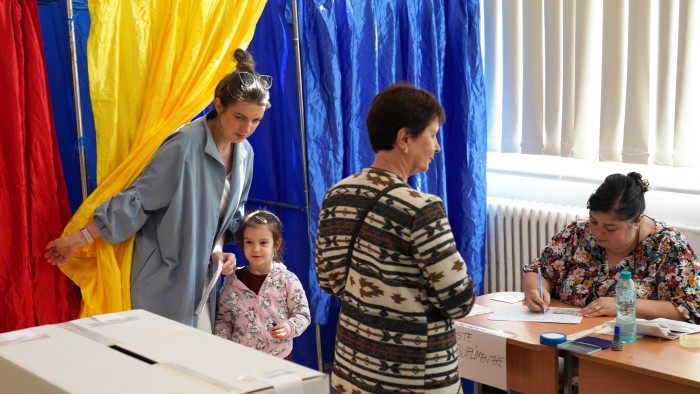Unlock the Editor’s Digest for free
Roula Khalaf, Editor of the FT, selects her favourite stories in this weekly newsletter.
Romanians flocked to polling stations on Sunday in large numbers to elect the country’s next president, in a choice between a pro-EU centrist and a far-right Eurosceptic.
About 25 per cent of the country’s 18mn voters had cast their ballots as of noon local time, almost 1mn more compared with the first round on May 4, which was topped by ultranationalist George Simion with 41 per cent of the votes.
But Nicușor Dan, the independent mayor of Bucharest who scraped past his opponents to qualify for the run-off with 21 per cent, has caught up in opinion polls and is counting on the huge turnout to tip the scales in his favour.
“This is a turning point. I voted for a European direction, not for Romania’s isolation,” Dan said when casting his ballot on Sunday.
The country has been gripped by a political crisis since November, when little-known far-right candidate Călin Georgescu won the first round of the presidential elections, which were subsequently cancelled due to alleged Russian interference. Georgescu was banned from running again and is under criminal investigation for campaign finance violations and attempts to subvert the democratic order.
Simion has pledged to appoint Georgescu as prime minister if he becomes president. On Sunday, the pair voted together, with Georgescu saying he voted for traditional family values and for “healing and forgiveness”. Simion said he cast his ballot “against the injustices committed against the Romanian people”.
Voters in Bucharest were anxiously awaiting the outcome of this election.
“I hope we can put this horrible period behind us once and for all, and do it in a way that will push Romania to the future, not the past,” said Răzvan Popescu, a father of two. “We need change, but we need change for the better, not the worse.”
Simion’s first-round win already caused political and economic turmoil, with the prime minister resigning, the Romanian leu dropping sharply against the euro and the country struggling to raise debt on international markets. Romania runs the highest budget deficit in the EU and its credit rating is just one step above junk status, analysts have said, warning of an even deeper crisis in the event of a Simion victory.
“We have massive mobilisation of the two camps at the last minute, and really strong participation,” said independent political consultant Radu Magdin. “If participation exceeds 60 per cent, that will probably favour the outlier, Dan. It will be tight.”
He added that the large Romanian diaspora — where voting began on Friday and more votes were registered by Sunday noon than in the first round — could swing the result either way. Polling stations close at 9pm local time, when exit polls are released.
Romania’s semi-presidential system gives the country’s head of state more powers than in many European countries, with the president setting foreign and security policy, taking part in EU leaders’ meetings and having the last say on decisions such as military assistance to Ukraine.
Simion has been sceptical of Ukraine, which shares a 600km border with Romania, and said aid had to stop as it only perpetuated the war. Dan is firmly committed to helping Ukraine and to Romania remaining a steadfast EU and Nato ally.
Former president Traian Băsescu on Sunday said the vote was also a referendum on the pro-western path the country has taken since the fall of communism.
“Probably, today, the people will decide whether it was good or not,” Băsescu said. “If the option is pro-Moscow, one candidate will be voted for, if the option is pro-Atlantic, another candidate will be voted for. It is a decisive day.”
Read the full article here




